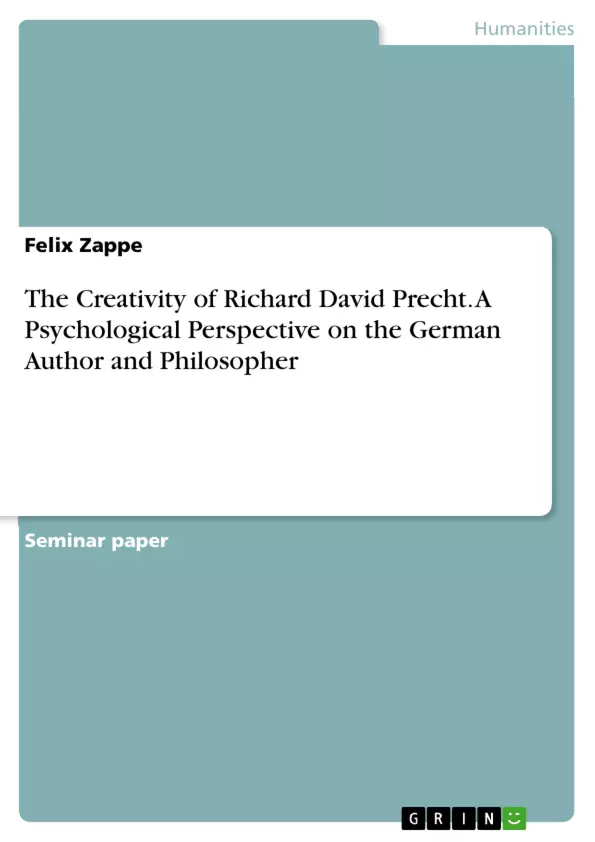This paper explores the personality of Richard David Precht. It shows his work and private life as well as his upbringing. This work then further explores the influence of his background on his creativity from the view of experts and then explains Precht's views on the given topics. The topics focussed are the nature vs. nurture debate, the influence of intelligence towards creativity and the creative process and its motivation.
Despite a certain general knowledge or common sense about what creativity is, the issue of an exhaustive scientific definition for the term 'creativity' is under broad discussion among scholars. It is argued here that the investigation of the psychological underpinnings of a creative individual taking the profession of a philosopher might be of some value to understand or at least give a brief idea what beliefs and predispositions could enable persons to engage and influence public discussions and bring new and valuable ideas to the society for the better of its majority. The individual selected for this case study is the German philosopher, author, speaker and public intellectual Richard David Precht who, in his position, could serve as one example of extraordinary display of the causes and effects of applied creativity.
Table of Contents
- 1 Introduction
- 2 Information about Richard David Precht
- 2.1 Precht's Work
- 2.2 Precht's Private Life and Upbringing
- 3 The Nature vs. Nurture Debate
- 4 The Contribution of Intelligence
- 5 The Creative Process and the Motivation
- 6 Conclusion
Objectives and Key Themes
This case study aims to explore the psychological foundations behind the creative output of Richard David Precht, a prominent German philosopher and public intellectual. It investigates the interplay of various factors contributing to his creativity, examining his work, life experiences, and perspectives on relevant psychological concepts.
- The nature versus nurture debate in relation to Precht's creativity.
- The role of intelligence in Precht's creative process.
- Analysis of Precht's creative process and working methods.
- Examination of Precht's motivations for creative engagement.
- The influence of Precht's upbringing and personal life on his creative output.
Chapter Summaries
1 Introduction: This introductory chapter establishes the challenge of defining creativity scientifically, referencing Runco and Jaeger (2012) and Gaut (2010) who highlight originality, value, and "flair" as key aspects. It positions philosophy as a particularly creative discipline and introduces Richard David Precht (RDP) as the subject of the case study. The chapter outlines the study's objectives: examining the nature versus nurture debate, the role of intelligence, the creative process itself, and RDP's motivations within the context of his philosophical work and public engagement.
2 Information about Richard David Precht: This chapter provides background information on RDP's life and work. It describes him as a German philosopher, publicist, professor, and public intellectual known for his diverse opinions on topics such as bourgeois society, migration, and animal rights. The chapter highlights the conflicting viewpoints on his expertise and the breadth of his published works, encompassing both fiction and non-fiction, with a focus on philosophical topics presented accessibly to a wider audience. His experience as a television moderator is also noted, demonstrating the varied platforms through which he shares his ideas.
Keywords
Richard David Precht, creativity, philosophy, public intellectual, nature vs. nurture, intelligence, creative process, motivation, Germany, public discourse.
Frequently Asked Questions: A Case Study of Richard David Precht's Creativity
What is the main focus of this case study?
This case study explores the psychological underpinnings of Richard David Precht's creativity, a prominent German philosopher and public intellectual. It examines the interplay of various factors contributing to his creative output, including his work, life experiences, and perspectives on relevant psychological concepts.
What are the key themes explored in the study?
The study investigates the nature versus nurture debate in relation to Precht's creativity; the role of intelligence in his creative process; an analysis of his creative process and working methods; an examination of his motivations for creative engagement; and the influence of his upbringing and personal life on his creative output.
What is included in the "Table of Contents"?
The table of contents outlines the structure of the case study, including an introduction, a chapter detailing information about Richard David Precht (his work and personal life), a chapter on the nature vs. nurture debate, a chapter on the contribution of intelligence to his creativity, a chapter on the creative process and motivation, and a concluding chapter.
What is the significance of the chapter summarizing Richard David Precht's life and work?
This chapter provides crucial background information on Precht's life and career, highlighting his diverse roles as a philosopher, publicist, professor, and public intellectual. It details his wide range of published works, both fiction and non-fiction, and his experience as a television moderator, showcasing the varied platforms through which he communicates his ideas.
How does the study define creativity?
The introduction acknowledges the challenge of scientifically defining creativity, referencing Runco and Jaeger (2012) and Gaut (2010), who emphasize originality, value, and "flair" as key aspects. The study positions philosophy as a particularly creative field and uses Richard David Precht as a case study to explore these concepts.
What are the chapter summaries provided?
The document provides summaries for each chapter, outlining the key points discussed in each section. These summaries provide a concise overview of the study's content and findings. For example, the introduction establishes the study’s objectives while Chapter 2 focuses on biographical information about Richard David Precht.
What keywords are associated with this case study?
The keywords associated with this case study include: Richard David Precht, creativity, philosophy, public intellectual, nature vs. nurture, intelligence, creative process, motivation, Germany, and public discourse.
- Arbeit zitieren
- Felix Zappe (Autor:in), 2017, The Creativity of Richard David Precht. A Psychological Perspective on the German Author and Philosopher, München, GRIN Verlag, https://www.grin.com/document/376082



